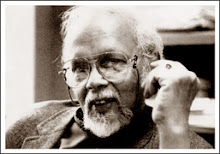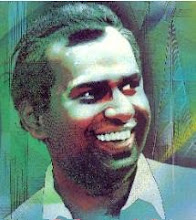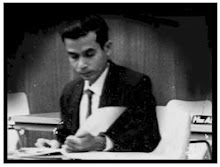Date:20/02/2011
Source: Sunday Observer
At the time of Richard de Zoysa's death in February 1990, a month before his thirty second birthday, he had for long been established as the most promising of Sri Lanka's young English language poets. Therein of course lies a seeming paradox: a long period of promise implies that it was not fulfilled.
 This is sadly true. There are just over thirty poems included here, and these represent almost all that Richard produced. There was at least one other very late gem, about his work in Jaffna along with Waruna Karunatilleke which he gave me for possible publication and then took back; but that unfortunately I cannot now trace. Apart from a few like that, and some others that were published in his school magazine (which have not been included, because he would undoubtedly have wanted them revised into better final form), Richard wrote no other poems.
This is sadly true. There are just over thirty poems included here, and these represent almost all that Richard produced. There was at least one other very late gem, about his work in Jaffna along with Waruna Karunatilleke which he gave me for possible publication and then took back; but that unfortunately I cannot now trace. Apart from a few like that, and some others that were published in his school magazine (which have not been included, because he would undoubtedly have wanted them revised into better final form), Richard wrote no other poems.
From the point of view of Sri Lankan letters in English, this is tragic. The fact however is that Richard lived a very full life in a great many dimensions: he was actor and drama teacher, journalist and broadcaster, human rights activist and political and social thinker. In accomplishing as much as he did in those various spheres, he devoted much less time to poetry than was desirable from a purely literary standpoint; and even sadder than this was the fact that his commitment to one or more of these areas led to his murder at the hands of paramilitary forces unwilling or afraid to have their conduct or his openly scrutinized. The point one needs to make here however is that, even though art was the loser, Society from Richard's point of view was the intended beneficiary of all else he did. Since he saw art too as being primarily justified by its social goals, there is the less reason to regret the diffusion of his energies in so many other directions.
* * *
Richard's basic concept of poetry as social criticism is most apparent here in the political commentaries produced between 1981 and 1983, and later in 1988, in a couple of pieces very different in content and form. The first group deal largely with the ethnic violence that in the form of active government involvement first reared its head in 1981, to burst out more viciously with disastrous consequences in 1983. 'Apocalypse Soon', with which this book opens, is a relentlessly prophetic account of the turn that such ethnic violence would take. Richard's foresight in predicting the traumas, largely for economic reasons, that would affect the otherwise complacent capital of Colombo, and also the role that would be played by India (described as Jambudvipa hanging
pendulous to the North
.......stained with her own blood
Bleeding heart red as ripe pomegranate
And bitter as the damson. All the fruits of hate
Quivering she holds. Waiting to drop
Into our gaping mouths)
all mark out an intensity of wide social awareness that was shared by few other writers of the time.
'Animal Crackers', the poem that a couple of years later was joint winner of the New Ceylon Writing prize for poetry that emerged from the 1983 riots, is perhaps his most assured piece in this respect. The slow development, from playing with a child (based on a very real experience at the time) to recording the plots and the passions that affected so many interest groups, succeeds admirably in conveying the imperceptibly increasing horror of that period. Notable too here is Richard's animal imagery in describing Tamil extremists, Sinhalese chauvinists, and the government involvement that set up the blaze. Animal associations were not of course Richard's invention, Tiger and Lion and Elephant (though not jackal) being used by the groups themselves as identification. The juxtaposition here however, with its sudden invocations of brutal and callous reality, illuminates vividly the situation that obtained.
Shortly before that poem and these troubles, Richard had already used the image of the elephant to convey what was building up, in 'Gajagavannama', his evocative account of an incident that occurred in February 1983. In an author's note he penned later for an anthology, he mentioned directly the connection with the July riots; but it should be noted that the poem had been written a couple of months earlier, being based on his awareness, from trying to help the ruling party with its 1982 referendum campaign to extend the life of Parliament, of how ruthless, albeit still on the surface restrained, that party had become. The use then of the riotous elephants of February to foreshadow an increasingly dominant fact of life in this country was immensely powerful.
The two political poems penned nearly five years later display a different facet of Richard's sensitivity. The animals in 'Birds, Beasts and Relatives' are not symbols used to allocate political responsibility, but are introduced rather to convey Richard's despair at the violence that was springing up on all sides to distort fundamental humanity. 'Rites of Passage' on the other hand is a more personal and personalized cry. While capturing the more and more restrictive transitions the nation underwent in the period it spans, it also characteristically suggests the sympathy Richard felt for members of the regular armed forces. Having done some work for them in the preceding period, and in particular during the offensive they launched in the Vadamaarachchi peninsula in May 1987, he had begun to feel that they were increasingly being treated as fodder, by a government that kept on redefining the enemy without any principles that the average soldier in the field could empathize with or even comprehend.
In this respect my major regret with regard to this book is that I cannot trace now the poem he wrote about the Vadamaarachchi offensive, for Waruna, whom he had worked with, and with whom he had flown to the front. It caught most movingly both the exhilaration and the sense of imminent loss attached to a struggle to which, however briefly, it seemed to him commitment was possible.
* * *
Richard's faculties of social criticism addressed other areas too, as can be seen from the haunting 'Lepidoptera', written at a time when he was keenly aware of deficiencies in the educational system that prevailed; and also from the title poem, 'This Other Eden'. Richard himself was no prude, and was indeed very free in his own personal conduct as well as his responses to other people, but exploitation was something he always found repugnant. As remarkable here however as his depiction of the predatory foreigner, at a time when the country was being touted as a cheap paradise for homosexuals, was the imagery he used with its Classical and Christian connotations. And this is the more interesting because it echoes his first major published poem, 'Good Friday', which recreates so movingly a mind in the throes of suffering, but conscious and confident of future justification. 'This Other Eden' is far more diffident in tone. For that very reason, the underlying sense it conveys of inner strength and resistance is to my mind even more powerful.
It is that capacity to hold an inner core inviolate that informs too the elegies he wrote, which sprang often but not invariably from his own romantic attachments. To this category belong the two 'Corporation Love Songs', about his time at Rupavahini, the State Television Corporation, as well as a couple of the hitherto unpublished poems that appear here. Vivid as are the sentiments conveyed, and skilful the techniques employed, it is the sense of restraint that comes out most strongly here, the sense of the emotions in question being observed by a detached self.
In this respect such poems differ from the lyrics that suggest, perhaps because of the greater contrasts between the personalities depicted, a greater emotional commitment: 'Of Thee I Sing', which was written quite recently, and 'Now Time', written in 1983 when Richard's political judgments were also being vividly formulated. Emotionally however perhaps the most powerful poem of all is the elegy 'Oh, Boy', which he produced very diffidently nearly a decade ago, and which was the herald of the talent that then, so briefly and restrictedly, bloomed. The boldness of its imagery, the sureness with which it is carried through, the strength of its unusual rhythms, the power of the feelings conveyed, all make this the harbinger of a remarkable new dispensation:
Now time to hurtle
Blazing, towards incandescent extinction
And substitute the Phoenix for the Turtle.
* * *
If not quite as important as the subject matter of his poetry, certainly worth noting (especially at a time when not only younger aspirants were, almost all, writing in a free form that paid little attention to rhyme or rhythm) was Richard's technical skill. His own thorough knowledge of and concern for the best in English Literature made him an adept at understanding the potential of various verse forms and rhyme schemes. His knowledge not only of terms but of what those terms meant and what various usages could convey was unique for someone of his generation.
Of the rhythmic feet that he could illustrate at will, he was fondest of anapaests, as can be seen from such perhaps self indulgent lines as
the clichés that govern the world of the words
of the prophets and preachers and may be the saviours
are lost to my peering
blind eye in the dark;
but he was equally good at exploiting the full potential of other unusual rhythms as in
Fat white man
Sitting with elbows on the batik cloth.
Equally, he was concerned about forms, and enjoyed experimenting with them; it is certainly a pleasure to view him compressing his thoughts into quatrains, as in the splendid satire "Talking of Michelangelo", or in carefully crafted but ostensibly throwaway pieces such as 'I'd like to grab your wayward heart'. In this regard it is worth registering how often he revised his work, frequently rethinking what his original inspiration had dictated - as can be seen from the manuscript of 'Gajagavannama', which is fortunately still preserved and has been reproduced here, immediately after the version that was finally printed.
 Most remarkable perhaps in terms of craftsmanship were the sonnets he produced, and though he was rarely satisfied with these (the note on the ms. of 'Last night I cried.....' reads "As usual the couplet is a dead bore.
Most remarkable perhaps in terms of craftsmanship were the sonnets he produced, and though he was rarely satisfied with these (the note on the ms. of 'Last night I cried.....' reads "As usual the couplet is a dead bore.
The rest is quite fun, don't you think?"), they are still pretty remarkable exercises in discipline and controlled thought - as are indeed the two parodies he produced for the satirical magazine Between the Lines, 'Colombo 1981' and 'Broken Promise'.
Such exercises proved invaluable for the free verse too, in that in those poems too the rhythms and the rhymes that are used are assured and consistent and contribute immeasurably to the thrust of the work. The sudden spondees and half rhymes of 'Apocalypse Soon' for instance reinforce the sharp contrasts that are drawn, while the manner in which the various animals in 'Animal Crackers' are conveyed through rhythmic changes certainly helps to create the vivid atmosphere of the piece.
Given Richard's immersion in Western literary forms, such technical skill is perhaps understandable, relatively unusual though it is in Sri Lankan poetry in English. What is surprising is the manner in which on occasion Richard combined this with a distinctively Lankan idiom. Though his literary background, and very often the subject and style of his poems, led to the use of what is termed Standard English, when it seemed desirable he was well able to blend in particularly Lankan terms and turns of phrase. Thus in 'Apocalypse Soon' we have the 'Junction stations (that) soon will fill', and the 'Brahmins' that hover, denoting not only the birds but exalted Indian Civil Servants waiting to swoop on their prey; in 'Lepidoptera', 'I couldn't do a thing'; in 'Rites of Passage':
maybe in this South
Things happen near dawn that happen nowhere else.
Up and down narrow, winding, ill-lit streets
Past guesthouses - a sleeping petrol shed
and of course the evocative baila rhythms of the opening stanza. Certainly there is no question but that, unlike for some of the new writers in English who have been emerging recently, English was for Richard his first language. Given however that previous poets of a similar background had relied almost exclusively on Standard English forms and images, his own capacity to blend those with Lankan usages too marks his distinctive breadth.
* * *
In the end however, important as these features are, we return to what seems to me the most important aspect of Richard's poetry: the subjects with which he dealt, and the thoughtful commitment that their wide range indicates. Of course Richard himself was well aware, as 'Talking of Michelangelo' makes clear, that writing that was indicative of social awareness was not necessarily a mark of commitment.
That fact however is what reinforces the point made above, that we should not regret the relatively modest output of poetry, which is all we have.
There are other writings too, on an even wider range of subjects, didactic and critical, and I trust some of them at least will be reproduced in a more enduring form.
But above all we should be aware that Richard fulfilled the demands of his social conscience in a multitude of ways; and if he had to die, on account of fears or suspicions with regard to one or other of the areas with which he was concerned, it is because of the commitment and the capacity to subsume self of people like him that
at least tomorrow's
lamp will burn bright.
Gajagavannama
(February 1983 - Gangaramaya Perahera)
The elephants are out. Last night they marched
gorgeous through streets, caparisoned like kings,
electric radiance shattering the night,
laden with relics, talismans and things.
Dawn came. And they were tethered in their stalls
(the back garages of an Institute of Education)
where they swayed and chafed,
had time for thought. A notion then took root
in the huge cerebellum that uncoils
behind the great, domed skull. 'We are the lords
of open spaces. Great bucolic monarchs
of the land." The city's teeming hordes
hooted and jangled by beyond the walls
that prisoned and demanded patience from them.
With one accord they snapped their ankle chains
and lumbered forth towards the gates to storm them.
The city froze. Then birds sprang to the air
and men to trees. Vehicles clambered walls.
All order vanished as the blind grey surge
swept down the arcades and the trumpet calls
drowned klaxons, sirens, bells, horns, engines - swamped
the roaring of the bloodstream of Colombo.
Quite suddenly it ended. Having made
his point, the pachyderm returned to Jumbo
and plodded meekly home. The city now
knows behemoths, aroused, will rule by riot.
We bow the head and bend a loyal knee
to jungle law, in hope of peace and quiet.
NLR 2 (1984)
Author's Note
Gajaga Vannama - Elephant Dance (a traditional dance form)
In February 1983, some elephants brought to Colombo for the Navam Perhera held by the Gangarama Temple broke free from the makewhift stalls where they were tethered and ran through the streets of Colombo.
The elephant is the symbol of the UNP, the ruling party of Sri Lanka (from 1977 to 1994). UNP thugs are believed to have been heavily involved in organized anti-Tamil violence in July 1983)
This Other Eden
Fat white man
sitting with elbows on the batik cloth
(the table rotting underneath)
nibbling like dowager at potted shrimps
imperial dominance emphasised with fork
in languid hand.
White slug
burrowing the fertile Orient soil, and boring me
with needle eye behind steel rim,
tales of (erotic)
conquest.
Boring me to the quick, piercing my soul!
A street away, my lover waits for me
the lamp burns low, tomorrow needs refilling.
O, Christ died not so hard on Calvary
for love of Man, nor went he forth so willing
as I do now.
The Romans on their thighs
wore sword and dagger, and crucified
spreadeagled nations, naked to the skies
and pierced with spears, but no not in
the side,
here, in the centre of my aching earth
I hold the pain, the rotting maggot seed
of the white carrion.
Clenched in my first (o, clenched to fight the fight)
the Mater Dolorosa -
Mother of Dollars.
At least tomorrow's
lamp will burn bright
NLR 1 (1983)




































No comments:
Post a Comment